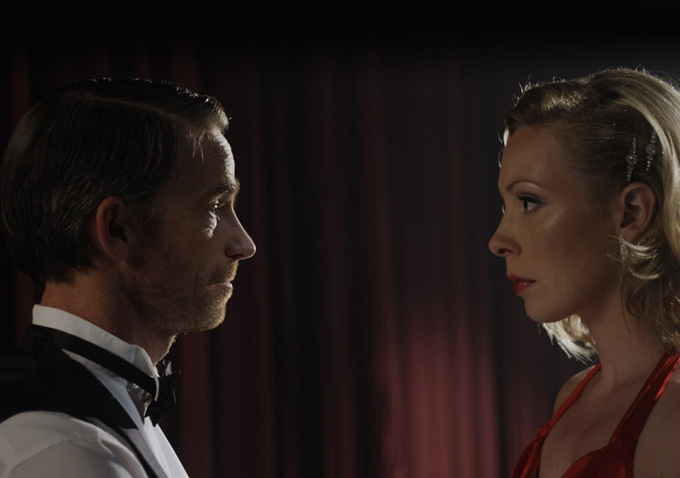 At the beginning of Max Currie’s debut feature “Everything We Loved,” we see a man sharing a few tender moments with his small son. It soon becomes clear that something’s amiss in this twosome however, as Tommy (Ben Clarkson), the boy, inquires after his mommy, and Charlie (Brett Stewart), explains that she’s dead. Tommy’s not buying it though, and so Charlie distracts him with magic tricks and a Christmas celebration. The audience understanding of the situation slowly and continuously evolves as tiny, almost missable bits of information unfold onscreen: a news broadcast about a missing boy; a Christmas book labeled “Hugo”; Charlie telling Tommy, “I’m not the daddy that made you.”
At the beginning of Max Currie’s debut feature “Everything We Loved,” we see a man sharing a few tender moments with his small son. It soon becomes clear that something’s amiss in this twosome however, as Tommy (Ben Clarkson), the boy, inquires after his mommy, and Charlie (Brett Stewart), explains that she’s dead. Tommy’s not buying it though, and so Charlie distracts him with magic tricks and a Christmas celebration. The audience understanding of the situation slowly and continuously evolves as tiny, almost missable bits of information unfold onscreen: a news broadcast about a missing boy; a Christmas book labeled “Hugo”; Charlie telling Tommy, “I’m not the daddy that made you.”
The situation becomes crystal clear with the arrival of Charlie’s wife, Angie (Sia Trokenheim). She seems broken and grieving, and horrified that Charlie has a strange boy in the house. A strange boy who is a ringer for their dead son. Charlie manages to convince Angie not to call the police to report the kidnapping, and to try loving the little boy as their own, telling her that Tommy’s parents are abusive, deadbeat addicts. She believes him, and soon the grieving parents are parenting again, carefully eluding anyone who might spot Tommy from the news, or anyone from their old lives who might remember Hugo. Charlie is a magician, Angie his assistant, and they are skilled in the quick-thinking sleight of hand that protects their little domestic oasis, for a time.
 Of course the situation isn’t tenable, as the tensions and sacrifices they make in order to raise the boy reveal cracks in the facade. The choices that both Charlie and Angie make, together and apart, begin to have real consequences. You can’t un-ring a bell, and you can’t un-kidnap a child, as sweet and good of a life as you have created for him.
Of course the situation isn’t tenable, as the tensions and sacrifices they make in order to raise the boy reveal cracks in the facade. The choices that both Charlie and Angie make, together and apart, begin to have real consequences. You can’t un-ring a bell, and you can’t un-kidnap a child, as sweet and good of a life as you have created for him.
One of the best elements about “Everything We Loved” is the deliberate storytelling and the measured, but effortless reveals that change the entire understanding of the story in a second. The film doesn’t telegraph a thing, and so the comprehension of the situation is constantly shifting and tense. Small and intimate moments are knit together and one string is pulled to begin the unraveling, though the unraveling was inevitable all along. Pulling back to see the story as a whole, it seems shocking, scandalous, and unbearably sad and unbelievable, but the microscopic and empathetic approach lends it a deeply humanistic side.
 The storytelling wouldn’t be possible without the stellar performances of the three leads. Brett Stewart as Charlie is the broken yet hopeful father, and the status of his mental state remains appropriately obtuse. Despite his actions, it’s impossible not to feel for him and at least try and understand. As Angie, Sia Trokenheim is devastating, not sure where to put her love, her grief, her frustration. And Ben Clarkson gives a remarkable performance for such a young child, able to portray the autonomous desires and confusion of Tommy as an individual in this trio.
The storytelling wouldn’t be possible without the stellar performances of the three leads. Brett Stewart as Charlie is the broken yet hopeful father, and the status of his mental state remains appropriately obtuse. Despite his actions, it’s impossible not to feel for him and at least try and understand. As Angie, Sia Trokenheim is devastating, not sure where to put her love, her grief, her frustration. And Ben Clarkson gives a remarkable performance for such a young child, able to portray the autonomous desires and confusion of Tommy as an individual in this trio.
This story as a tabloid headline would seem so much different than the one told in “Everything We Loved” (and this is alluded to in the film), so it’s illuminating to see a tale such as this approached from the other side. It in no way endorses what they did, but explores both the motivations and consequences of these choices. Gorgeously shot, with a tinge of darkness and grime, the style reflects this approach of an intimate and realistic look at human darkness. Writer-director Max Currie is no doubt one to keep an eye on, as this first feature is stunningly accomplished and deeply affecting. [A-]

